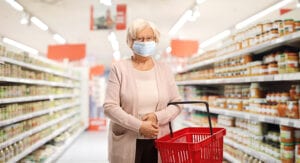COVID – How to Eat Healthy When Food Stocks Are Low

In some areas, bare grocery shelves are an ongoing problem. Finding items like canned goods, rice and dried beans, frozen vegetables, and pasta has been impossible. Shelves for bread, flour, sugar, and leaveners are empty. When food stocks are low, how do your parents eat well?
There are ways to stick to a healthy diet even if supplies are limited. These tips should help.
Aim for Proteins
While canned beans aren’t always easy to find, your parents may have better luck with dried beans. Dried beans are easier to cook than you might think. Soak them overnight. Cover the beans fully with water. The water should be at least two inches over the top of the beans. Add a teaspoon of baking soda to the water. Cover and leave to soak while you sleep.
The next morning, rinse the beans fully. If the beans are red kidney beans, boil them for a minimum of 30 minutes. Drain and move them to a slow cooker following your preferred recipe for chili, red beans and rice or whatever you’re making. Other beans do not need to be boiled first before using them in a slow cooker.
Fresh Produce Is Easier to Find
Fresh produce hasn’t been as hard to find as frozen or canned. Look for grocery stores offering curbside pick-up or delivery and have your parents’ favorite vegetables and fruits delivered twice a week. This way, they won’t have waste as produce spoils.
If there are good sales on vegetables, blanch it using the guidelines at the University of Minnesota Extension’s handy blanching chart. Drain thoroughly and move to freezer bags. Your parents will have frozen vegetables for the weeks and months to come.
Grains to Rely On
Many common grains like rice and pasta have been selling out quickly. Stores are having a hard time keeping them on shelves. It’s a good time to try other grains instead. Barley is an excellent grain that’s lower on the glycemic index if diabetes is a concern. You’ll also find that less common grains like farro, bulgur, and quinoa are still available.
How well do your parents do at preparing nutritious meals? Are they like other older adults who find it hard or too time-consuming? If your parents are letting meals turn into fast food trips, delivered pizzas, or freezer meals, take a closer look at caregivers. Your parents can have a caregiver cooking for them, serving their meals, and cleaning up after.
Caregivers become trusted companions. Your parents have someone to help them shop for groceries, drive them around, and help with housekeeping and laundry. Talk to a home care expert to discuss how to arrange caregivers while coronavirus has you sidelined and see if it’s worth keeping caregivers on for the months and years to come.
If you or an aging loved one are considering a Caregiver in Freehold Township, NJ, please contact the caring staff at Lares Home Care 888-492-3538 or 732-566-1112.
Sources:
